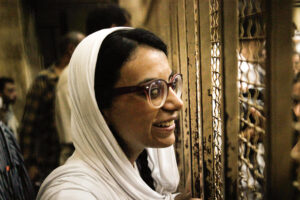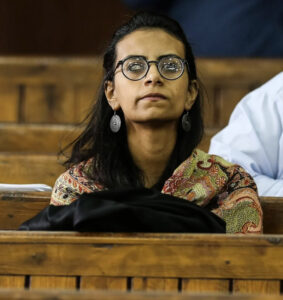A Hero Among Others
Mahienour El-Massry was born in Alexandria, Egypt, in a rather prosperous family. “Coming from a middle-class family makes you live in a kind of a bubble, especially in Egypt. You don’t see poverty, and you don’t see rich tycoons,” explains Mahienour. But as a teenager, she witnessed some events that had a profound impact on shaping her identity. One of them was the 2003 American intervention in Iraq. “Though I was totally against Saddam Hussein, I was a little bit shocked by the idea that it would be the people, the civilians who were going to pay the price of the American invasion,” says the activist.
Around the time Mahienour El-Massry went to study in a university, the Egyptian Movement for Change was launched, better known under its nickname Kefaya, or “Enough.” This grassroots coalition was formed to challenge Hosni Mubarak’s presidency, political corruption, and human rights violations. “At that time, I was 18, and it made me think of the idea of dictatorship and the idea of policy. I joined the Kefaya movement, and this opened my eyes to a new Egypt,” recalls Mahienour.
She felt that her country and its people were paying a huge price because of the dictatorship, with virtually no alternatives to the ruling party. “The only other shaped political group was the Muslim Brotherhood, and they had a strange slogan, which was “Islam is the answer”,” says the activist. “I cannot understand such things. You have to talk to me about economy, you have to talk to me about freedoms.”
Looking for answers and like-minded people, Mahienour joined a small Revolutionary Socialist group. “In Alexandria, where I come from, they started to displace people from their own houses to widen the port, for example, or to make new compounds. I helped the workers in the cement factories to fight against privatization and for their rights. I helped the fishermen, because there hasn’t been a syndicate or a union for them,” recalls Mahienour. “I started believing that people are not evil. Most of the people are put in very hard conditions that made them sometimes say or do wrong things. Evil people are a very small percentage in humanity, and we probably won’t find them in the streets. They have their own compounds and their own guns. They have their own palaces.”
“We thought, at the very beginning, that it was going to be a very small protest. Then people came from everywhere.”
In 2010, Egypt was shocked by the death of Khaled Saeed who was killed by the police, an event considered by many to be one of the catalysts of the 2011 Egyptian revolution. “We thought, at the very beginning, that it was going to be a very small protest. Then people came from everywhere,” she recalls. “The funny thing is that I had been arrested several days earlier because of the protest in solidarity with the people killed in the Qiddissin Church. On the 25th of January, my friends came to me saying: ‘You will not join this protest. Your face is very well-known and that will make the police spot us’.”
Not willing to risk their safety yet also unwilling to miss out on the action, Mahienour El-Massry assured them that she’d be discreet. At first, she only saw several smaller groups in the streets, but suddenly, people started pouring in. “I was surprised. I’ve never seen this number of people. Of course, we have been faced with arms; there was blood and guns; people have been injured. But you could see that they were not afraid. They were saying: “This is our country. This is our life. This is our future, and we cannot go back.” It was the day that I believed that people are stronger than anything, that years of depriving people of the rights and of a healthy political environment will not make them silent. People will surprise you. This is why, though we are in a horrible situation now, I still have faith,” smiles the activist.
As they were marching down the streets that day, Mahienour and her friends met their older peers, who had been activists in the 1970s. “My heart just leapt. I thought it was very generous of the Universe to make them see such a day. My aunt was a journalist, she was from the opposition. She died in 2000. I thought, ‘If she were here, it would have made her feel that she was right to believe in people’.”
President Mubarak was forced to resign, but the euphoria didn’t last too long. The revolution also scared the leaders who took over the country, which led to the tightening of political screws and more persecution for those who remained unsatisfied by the new regime and its stance on freedoms. Tens of thousands of Egyptians have since taken to the streets again to demand more. Many of them, including Mahienour El-Massry, have been arrested.
“We don’t have an accurate number of political detainees, but usually we say 60,000 – just by looking at the cases in court. I have been arrested four times since 2013. One day, I went to a police station to represent some protestors as their lawyer. I was arrested along with some of my colleagues. Altogether, I spent around three and a half years in prison. It may seem a lot, but it’s not huge compared to others here in Egypt,” notes the activist.
“My colleagues and I are also trying to launch campaigns against poverty, because the economic procedures here in Egypt are totally crazy.”
Mahienour’s latest release came in July 2021, and she went straight back to representing political detainees in courts. “My colleagues and I are also trying to launch campaigns against poverty, because the economic procedures here in Egypt are totally crazy. In addition, we are trying to make a kind of a “feminist wave” to support all the women asking for their rights in front of courts or trying to change some of the laws. This is here, in Egypt, but I’m also trying to reach out to other activists [abroad], people who think like me.”
This tireless activist gives the impression of a compressed spring, ready to soar into the air at the sight of any injustice. How does she manage to retain her passion and her faith in a better future? “I have huge support from my family and my friends, so, of course, things are easier. I feel luckier than other women activists who might, for example, be facing problems with their families, which to me is the worst thing that could happen. I feel very lucky. I feel privileged.”
“Presidents, dictators, tyrants make alliances with each other all the time and they know where their interests are. They try to divide us, but we have to find our own allies as well. And we have to be more humane. Of course, we are sometimes shocked with horrible things, but horrible situations make us think that we have to resist more. One of the lessons that I believe in is that the expression “the enemy of my enemy is my friend” is not true. It’s the one who believes in my beliefs who is my friend. This is the only thing.”





